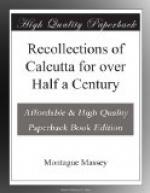The verandah above referred to, overhanging the footpath of the Great Eastern Hotel, was erected by Walter Macfarlane & Co. in 1883, and there is a curious story regarding it, related by my friend, Shirley Tremearne.
Before it could be erected the sanction of the Municipality was necessary, and under the Act they were entitled to charge a fee of Rs. 100 per month for such sanction.
The Municipality, however, refused to sanction it unless the Hotel Co. agreed to pay a monthly fee of Rs. 300. The Hotel Co. were in a fix, they had placed the order for the verandah as the Municipal Engineer, Mr. Jas. Kimber, had approved the plans, and willy-nilly they had to consent.
[Illustration: Photo by J. & H. The Exchange—Mackenzie Lyall’s old premises in Dalhousie Square.]
[Illustration: Photo by J. & H. The Exchange—Mackenzie Lyall’s premises from 1888 to 1918.]
However, one of the directors had been studying Bryce on ultra vires, and he went round to the Bar library to take advice from his friends there. Sir Charles Paul and Mr. Hill said offhand: But you agreed to pay, how can you get out of it? To this Mr. Tremearne (the director in question) replied: Yes, but it was an extortion, the Municipality is the creature of a statute, they have only statutory powers, and are not entitled to charge what is not sanctioned. As he was leaving, Mr. W. Jackson said: Look here, Tremearne, don’t pay that Rs. 300 a month.
A case was then sent to the Advocate-General, and he held that the Municipality were exceeding their powers in levying such a charge.




